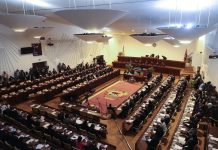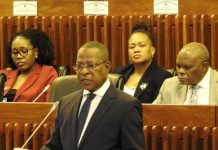Africa-Press – Mozambique. The Mozambican Supreme Court has ruled that an open letter, published in Facebook, critical of former president Armando Guebuza was not libellous.
This case has dragged on for a decade. It was in 2015 that the Public Prosecutor’s Office charged the author of the letter, prominent economist Carlos Nuno Castel-Branco, with crimes against state security.
This was because, under Mozambican legislation, libelling the head of state is regarded as a security offence. Fernando Mbanze, editor of the independent newssheet “Mediafax”, which published the letter, was also in the dock, charged with abuse of press freedom.
The open letter was highly critical of Guebuza, but Castel-Branco has always denied the charge of defamation, and says that he never intended to insult the President. In normal defamation cases, the citizen who feels offended must take action.
But since defaming the President is regarded as a security issue, it was the state that took action against Castel-Branco and Mbanze. Guebuza made no public statement about the matter, and did not have to appear in court.
Castel-Branco’s letter declared that Guebuza was “out of control” and called on him to resign.
The Maputo city court analysed in detail Castel-Branco’s letter – and could find nothing libelous in it. Giving his verdict, on 16 September 2015, Judge Joao Guilherme said that Castel-Branco had simply been giving his opinion about the way Guebuza ran the country. Other people might find his criticisms uncomfortable, but that did not make them a crime.
The language used by Castel-Branco might be regarded as “impertinent and vulgar, but the law does not deal with mere impertinence and vulgarity”, the judge declared.
Guilherme’s verdict was widely welcomed, in Mozambique and abroad, as a victory for freedom of the press. But the Public Prosecutor’s Office, instead of conceding defeat gracefully, took the risk of appealing against the verdict.
The wheels of justice turn slowly in Mozambique, and it was only in July 2020 that the Higher Appeals Court (TSR) gave its ruling – and strongly supported Judge Guilherme’s verdict.
The four judges on the TSR wrote: “in the heat of political discussion about the performance of the President of the Republic, who handles the policies of the country, with the money of the taxpayers, exacerbated spirits should be tolerated. Freedom of expression should prevail over the pretension of the defence of honour, for the good of society and of the democratic rule of law”.
Just like Guilherme, the TSR judges could find nothing libellous in Castel-Branco’s text. In their view, he had merely been exercising his constitutional right to freedom of the press.
The Public Prosecutor’ had found it offensive that, at one point in his open letter, Castel-Branco had written “the President and all the warmongers, criminals and would-be fascists will be tossed into the rubbish bin of history”.
But the TSR thought that there was nothing extraordinary about such polemical passages. “The President of the Republic, because of his topmost position in the leadership of the State is exposed to criticism. Calling on a President to resign because the writer does not believe he is handling correctly the destinies of the country is normal throughout the world”, the Court said.
Thus the Public Prosecutor’s Office was roundly defeated twice. At this point, most intelligent prosecutors would have thrown in the towel. But instead, the Mozambican prosecutors were granted leave to appeal against the TSR ruling all the way up to the Supreme Court. Such appeals can only be made on issues of law, not on matters of fact.
Thus, the Public Prosecutor was asking the Supreme Court to rule that both the Maputo City Court and the Higher Appeals Court do not understand the law.
It took another four years for the appeal to be heard, but in October the Supreme Court ruled in favour of the two lower courts, although the decision was only made public on Wednesday.
This should finally bring the matter to a close, since the prosecution has no further avenues of appeal.
This is a significant victory for press freedom and can be used as a precedent in any future attempt to stifle criticism of the country’s leaders.
For More News And Analysis About Mozambique Follow Africa-Press






